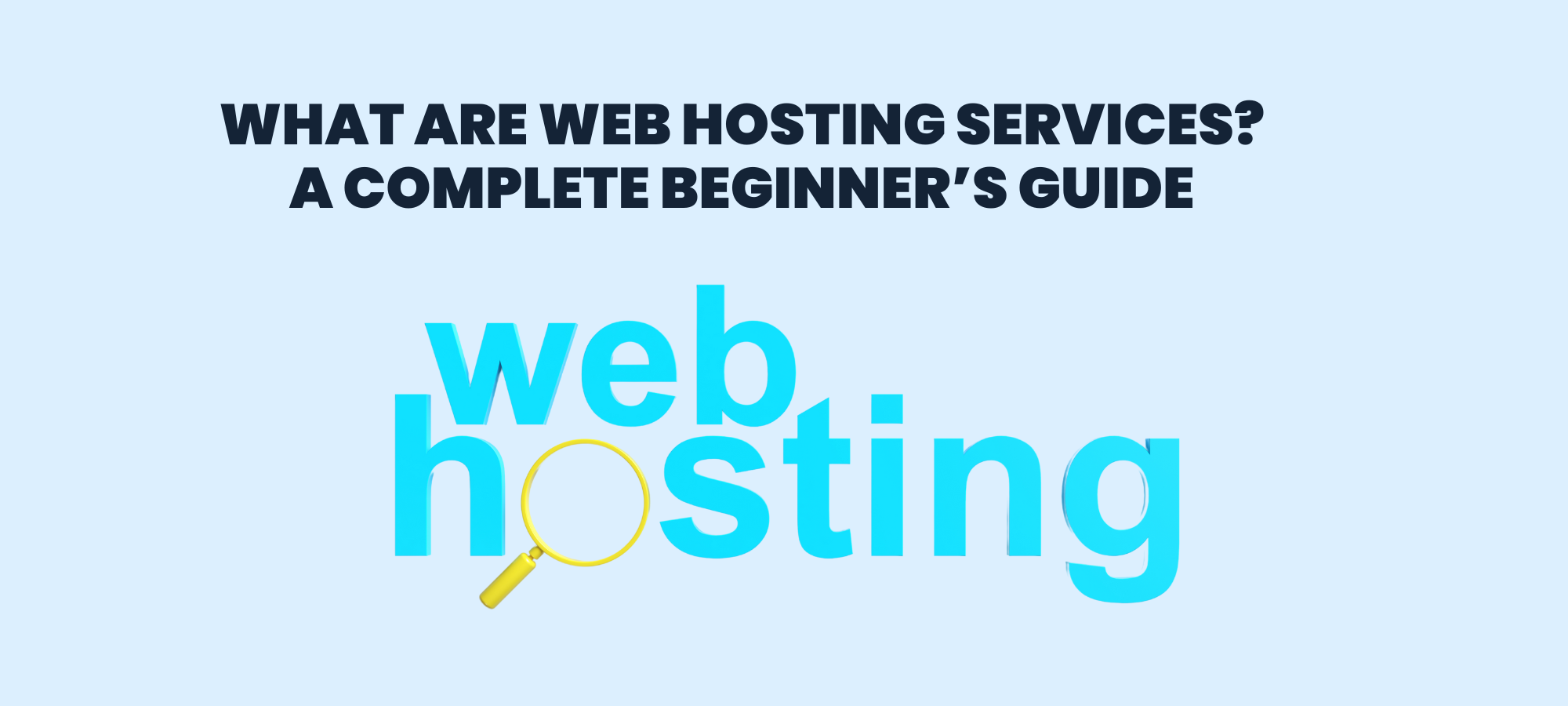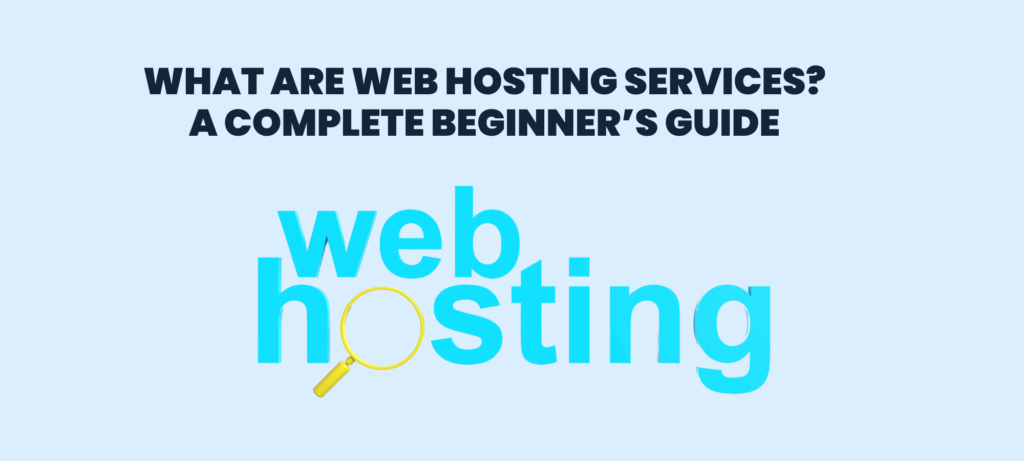If you’re building a website, you’ve probably come across the term web hosting. But what exactly does it mean? Why do you need it? And how do you choose the right web hosting service for your needs?
This comprehensive guide explains everything about web hosting services—what they are, how they work, the different types available, and what to look for when choosing one.
What is Web Hosting?
Web hosting is a service that allows individuals and organisations to publish their website or web application on the internet. In simple terms, it’s where your website lives.
When you create a website, it consists of various files, images, and data. These files need to be stored somewhere accessible over the internet. A web host provides the server space and technologies necessary to store and serve your website to users worldwide.
- Storage: Stores all website files, databases, and content.
- Bandwidth: Determines how much data can be transferred between the website and users.
- Server Maintenance: Handles security, software updates, and uptime.
- Domain Management: Often provides domain name registration or linking.
- Email Hosting: Offers personalised email services like info@yourdomain.com.
How Does Web Hosting Work?
When someone types your website’s domain name into a browser, the domain is linked to your hosting provider’s server. The server then sends the requested files to the user’s browser, displaying your site.
The Web Hosting Process:
- The user enters your domain (e.g., www.yoursite.com.
- DNS records point the browser to the correct server.
- The web server processes the request.
- Website files are loaded and delivered to the browser.
Types of Web Hosting Services
Not all websites need the same kind of hosting. Different hosting types offer various levels of performance, security, and management.
Shared Hosting
Shared hosting means multiple websites share the same server resources.
Best for: Beginners and small websites.
Pros:
- Budget-friendly
- Easy to set up
- No technical knowledge needed
Cons:
- Limited resources
- Slower performance during traffic spikes
- Shared IP address
VPS Hosting (Virtual Private Server)
VPS hosting divides a server into multiple virtual compartments. Each user gets a portion of the server’s resources.
Best for: Medium-sized businesses and growing websites.
Pros:
- Better performance than shared hosting
- Root access
- Scalable
Cons:
- More expensive
- Requires some technical knowledge
Dedicated Hosting
Dedicated hosting gives you a whole server for your website.
Best for: Large websites, enterprise-level traffic.
Pros:
- Full control and customisation
- High performance and security
- Dedicated resources
Cons:
- Expensive
- Requires technical expertise
Cloud Hosting
Cloud hosting uses a network of virtual servers instead of a single physical server.
Best for: Websites needing high availability and scalability.
Pros:
- High uptime
- Scalable resources
- Cost-efficient with pay-as-you-go
Cons:
- Variable pricing
- Can be complex to manage
Managed WordPress Hosting
This is optimised specifically for WordPress sites, offering tools and performance enhancements.
Best for: WordPress users who want hassle-free hosting.
Pros:
- Fast performance
- Security optimisations
- Automatic updates and backups
Cons:
- Limited to WordPress
More expensive than shared hosting
Key Features to Look For in a Web Hosting Service
Choosing a reliable web host is crucial to your site’s success. Consider these important features when selecting a hosting provider:
1. Uptime Guarantee: Look for hosts that offer 99.9% or higher uptime. Downtime means lost visitors and revenue.
2. Speed and Performance: Fast-loading websites improve user experience and SEO rankings.
3. Customer Support: Choose 24/7 customer support via chat, email, or phone.
4. Security Features: Opt for hosts with SSL certificates, firewalls, DDoS protection, and malware scanning.
5. Scalability: Can your hosting grow with your website? Check if the provider offers easy upgrades.
6. Control Panel (e.g., cPanel): A user-friendly control panel simplifies website management.
7. Backup Services: Automated daily or weekly backups are essential for disaster recovery.
Popular Web Hosting Providers in 2025
Here are some of the top hosting companies to consider in 2025:
- GoDaddy – Great for purchasing domain and beginners.
- SiteGround – Excellent customer support and speed.
- HostGator – Affordable and beginner-friendly.
- Hostinger – Managed cloud hosting for growing businesses.
- Cloudflare– Known for speed and performance.
Benefits of Using a Web Hosting Service
Using a reliable hosting service offers several advantages:
- Increased Site Performance: Fast loading improves SEO and user experience.
- Better Security: Regular updates and security tools protect your site.
- Professional Appearance: Custom domain emails and uptime create a credible brand.
- 24/7 Support: Technical issues are resolved quickly.
- Data Management: Control how and when your data is backed up or restored.
Who Needs Web Hosting?
Everyone with a website needs hosting, whether you’re:
- A blogger starting your first WordPress blog
- A small business launching an online store
- A developer creating web applications
- A corporation hosting an enterprise portal
Without web hosting, your website simply won’t be accessible online.
Conclusion
Web hosting is the foundation of your online presence. Whether you’re building a blog, online store, or corporate site, choosing the right hosting provider is crucial.
Evaluate your needs, consider the types of hosting available, and invest in a reliable service that supports your growth.
The right web hosting service doesn’t just store your files—it ensures your website loads quickly, remains secure, and can handle traffic as your audience grows.
In a competitive digital landscape, slow or unreliable websites can drive users away. A quality host can be the difference between a thriving online presence and a frustrating experience for your visitors.
Furthermore, hosting plays a critical role in search engine optimisation (SEO). Google takes page speed, uptime, and security into account when ranking websites.
That means your hosting provider directly impacts how discoverable your site is to new customers or readers.
If you’re serious about growing your brand online, cutting corners on web hosting isn’t an option.
Investing in scalable, secure, and high-performance hosting also gives you peace of mind.
With automated backups, malware protection, and responsive support, you can focus on building your content, marketing your site, and connecting with your audience, while your hosting provider handles the technical side.
Ultimately, web hosting isn’t just a background service—it’s a strategic decision.
Take the time to research providers, compare plans, and select one that aligns with your long-term goals.
Whether you’re just starting or scaling up, the right web host empowers your success on the internet.





